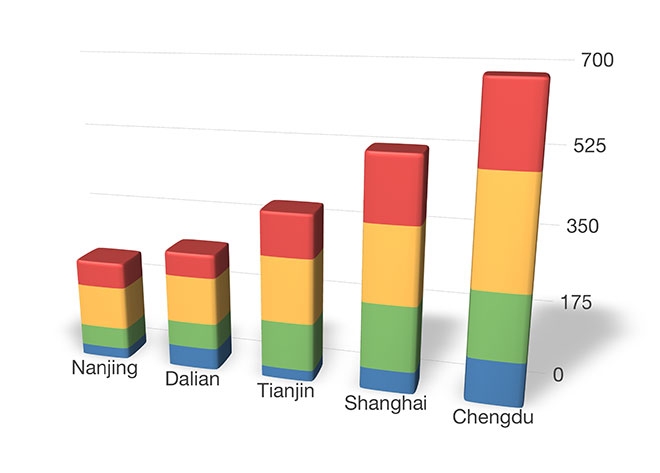According to an economic study conducted by the independent American think-tank Milken Institute, Sichuan’s provincial capital of Chengdu currently ranks as China’s top-performing city.
The study, which gathered data from 34 first and second-tier cities and 232 third-tier cities, lists Shanghai in second place, followed by Tianjin, Dalian and Nanjing. Shenzhen’s position in tenth place, coupled with Beijing’s notable absence in the top ten, may contribute to potential confusion about the rankings. According to China Daily, the rankings categorize such cities as Chengdu, Nanjing, Hefei and Changchun as first-tier cities. This calls into question the current method of ranking a city’s economic standing, and simultaneously asks whether or not Milken’s method is the more legitimate one. The primary indicators used by Milken Institute, including foreign direct investment, wage growth, employment levels and regional gross domestic product, result in rankings quite different from what many may have predicted.
Professor Sun from the Economics department of the Jiangsu Provincial Committee Party School expressed his disagreement with the study’s findings. In his opinion, Shenzhen’s level of economic power and marketization surpasses that of Chengdu; in addition, he believes that Nanjing’s economic development rivals Chengdu. In the study’s defense, Perry Wong, Milken’s Managing Director of Research, explained that Beijing failed to make the list due to its large economic base figure, as well as the fact that its economic growth rate was lower than other cities. He offered no further explanation to Nanjing’s fifth-place ranking.
In addition to comparing first- and second-tier cities, the Milken study also created a 10-city list of mid- and small-size cities. All of the cities are situated in the Yangtze River Delta Economic Zone, and seven are located in Jiangsu Province, with Suzhou, Nantong and Yangzhou topping the list. However, Sun finds fault with this list’s rankings as well, most notably Wuxi’s number eight position. He finds it difficult to understand why the surprisingly modern Wuxi is ranked behind cities like Suqian, Taizhou, Nantong and Yangzhou. Clearly, the question of whether the tier-ranking system is in need of reform will certainly not be a simple question to answer, as opinions vary not only between individual economists, but also by country.
Jiangsu’s success is due to a combination of factors: a large, educated workforce, proximity to Shanghai, and well-developed science and technology sectors. Wong said, “Years ago, a number of investors chose to invest in Jiangsu Province instead of Shanghai due to the fact that it was cheaper to operate there than in the giant coastal city.” Jiangsu’s fully developed infrastructure also contributes to its economic advantage; according to Li Xunlei, the chief economist at Haitong Securities Co Ltd., “Jiangsu’s convenient and improved transportation system also helps to promote more balanced economic development among its cities, making it take up more places on the list.”









